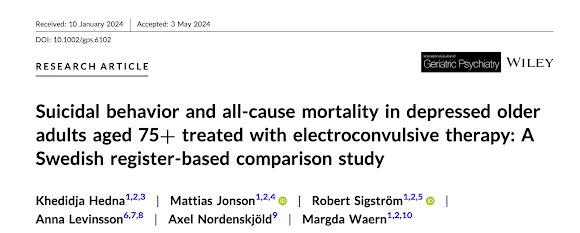Suicidal Behavior and All-cause Mortality in Depressed Older Adults Treated With ECT: A Swedish Register-based Study.
Out on PubMed, from researchers in Sweden, is this study:
Suicidal behavior and all-cause mortality in depressed older adults aged 75+ treated with electroconvulsive therapy: A Swedish register-based comparison study.
Int J Geriatr Psychiatry. 2024 May;39(5):e6102. doi: 10.1002/gps.6102.PMID: 38767969

The abstract is copied below:
Objectives: Electroconvulsive therapy (ECT) is effective in treating late-life depression. There is limited research on suicidal behavior and all-cause mortality in the oldest old after ECT.
Methods: Older adults aged 75 years and above who had been inpatients for moderate to severe depression between January 1, 2011, and December 31, 2017, were included in the study. We used exact and propensity score matching to balance groups. We compared suicidal behavior (fatal and non-fatal) and all-cause mortality in those who had received ECT and those with other depression treatments.
Results: Of the study population, 1802 persons who received ECT were matched to 4457 persons with other treatments. There were no significant differences in the risk of suicidal behavior between groups, (within 3 months: odds ratio 0.73; 95% confidence intervals (CI), 0.44-1.23, within 4 months to 1 year: aOR 1.34; 95% CI, 0.84-2.13). All-cause mortality was lower among ECT recipients compared to those who had received other treatments, both within 3 months (aOR, 0.35; 95% CI, 0.23-0.52), and within 4 months to 1 year (aOR 0.65; 95% CI, 0.50-0.83).
Conclusions: Compared to other depression treatments, ECT is not associated with a higher risk of suicidal behavior in patients aged 75 and above. ECT is associated with lower all-cause mortality in this age group, but we advise caution regarding causal inferences.
Keywords: all‐cause mortality; electroconvulsive therapy; geriatric psychiatry; late‐life depression; suicide.
The paper is here.
And from the text:
Here is yet another excellent Swedish registry study. These data should help to deal with the "Hemingway effect," in which people claim that ECT leads to, rather than prevents, suicide.
The reduction in all-cause mortality after ECT continues to be a fascinating, and salutary, finding. It is also worth noting that ~7% of this geriatric depressed population in Sweden got ECT; in the US, my guess is that it would have been much lower, in the 1-3% range.
Kudos to Dr. Hedna and colleagues for this important contribution to the ECT literature.







Comments
Post a Comment